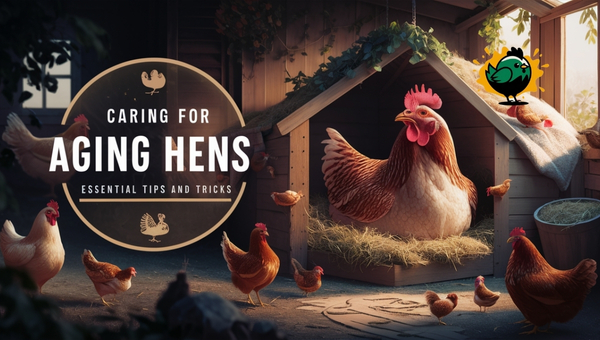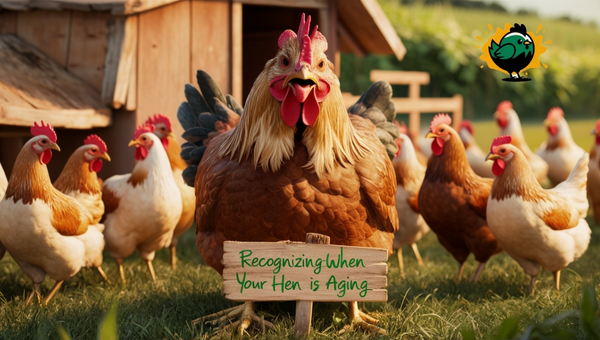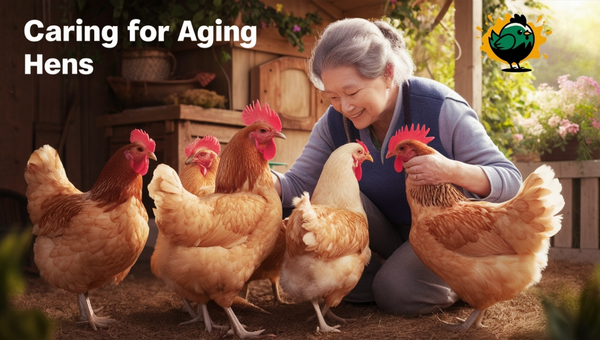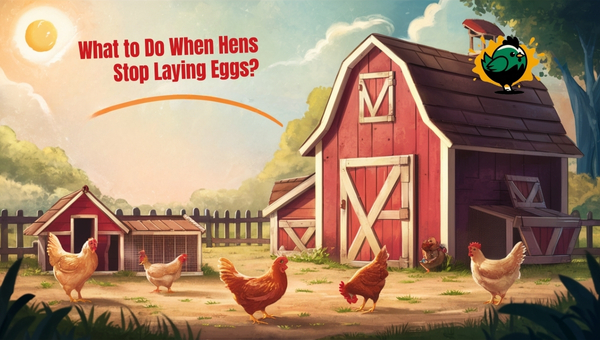Caring for Aging Hens | Essential Tips and Tricks

After years of caring for your flock, you’ve noticed that some of your chickens are becoming less active. They were very animated formerly, laying eggs every day, but now they appear more worn out and less prolific. For many chicken owners, this is a familiar situation.
Aging hens require special attention and care to ensure their golden years are comfortable and healthy. Recognizing the signs of aging and understanding how to cater to their changing needs can make all the difference. Let’s explore the best ways to care for aging hens, ensuring they remain happy and healthy members of your flock.
Recognizing When Your Hen Is Aging
As your hens grow older, you’ll notice subtle changes in their behavior and appearance. Identifying these signs early can help you provide the best care for your aging flock.

Understanding how to recognize the signs of aging and knowing the typical lifespan of hens can empower you to make informed decisions about their care.
Signs Your Hen is Reaching Old Age
Aging hens show several physical and behavioral signs that indicate their advancing years.
Here are some common indicators:
- Reduced egg production: Older hens may lay fewer eggs or stop laying altogether.
- Lethargy: Aging hens often become less active and may prefer resting more than foraging.
- Changes in appearance: Look for signs like feather loss, graying feathers, and duller plumage.
- Weight changes: Older hens might experience weight loss or have a more pronounced keel bone.
- Behavioral shifts: They may become less social or more reserved compared to their younger counterparts.
Life Expectancy of Hens
The lifespan of a hen varies by breed and living conditions. Generally, backyard hens live between 5 to 10 years.
Here are some key points to consider:
- Breed differences: Some breeds are more long-lived than others.
- Living conditions: Hens in a stress-free environment with good nutrition tend to live longer.
- Behavioral changes: As hens age, they may become less social and more prone to health issues.
- Productivity decline: Expect a decrease in egg-laying capabilities as hens get older.
- Health monitoring: Regular health checks become crucial as hens age to catch and manage potential health problems early.
Recognizing these signs and understanding the life expectancy of your hens can help you provide the care they need as they age.
Caring for Aging Hens
As your hens grow older, they require special attention to ensure they remain healthy and comfortable. Adapting their diet and living conditions can significantly improve their quality of life. Let’s dive into the essentials of caring for aging hens.

Adjusting the Diet for Aging Hens
Older hens have changing nutritional needs that should be addressed to keep them healthy.
Here are some key adjustments:
- Increase Protein: Provide a higher protein feed to support muscle maintenance.
- Boost Calcium: Ensure they get enough calcium to maintain strong bones.
- Add Vitamins and Minerals: Include supplements to cover any dietary gaps.
- Hydration: Make sure they have constant access to fresh water.
Keeping Aging Hens Comfortable in the Coop
Creating a comfortable living environment for aging hens is crucial. Here are some detailed tips to ensure their well-being:
- Easy Access to Food and Water: Position feeders and waterers at a height that is easy for older hens to reach. Consider using multiple feeding stations to reduce competition and stress.
- Soft Bedding: Use soft, absorbent bedding materials like straw or wood shavings. This helps cushion their joints and provides a comfortable resting place.
- Resting Areas: Designate specific resting areas with lower perches. Older hens may struggle to reach high perches, so providing lower options can help them rest more comfortably.
- Temperature Control: Ensure the coop is well-ventilated but free from drafts. In colder months, additional insulation or heat lamps may be necessary to keep them warm.
- Clean Environment: Regularly clean the coop to prevent the buildup of waste and bacteria, which can lead to health issues.
Managing Health Problems in Aging Hens
Older hens are more prone to certain health issues. Regular monitoring and early intervention can make a big difference.
Common health problems include:
- Arthritis: Look for signs like limping or reluctance to move. Provide soft bedding and easy access to food and water to help manage discomfort.
- Respiratory Issues: Watch for symptoms such as coughing or nasal discharge. Ensure good ventilation and keep the coop clean to prevent respiratory infections.
- Reproductive Issues: Older hens may experience egg binding or prolapse. Regular health checks and a balanced diet can help mitigate these problems.
- Parasites: Aging hens can be more susceptible to parasites like mites and lice. Regularly check for signs and treat promptly with appropriate medications.
Caring for aging hens requires thoughtful adjustments to their diet, living conditions, and health management. By making these changes, you can help your older hens enjoy their golden years in comfort and good health.
Also Read: Fighting Chicks | Causes and How to Stop Aggression?
What to Do When Hens Stop Laying Eggs?
When hens reach a certain age, their egg production naturally declines. Understanding why this happens and finding new roles for your aging hens can help you manage your flock effectively. Let’s dive into the reasons behind this shift and explore how older hens can still contribute to your farm.

Why Aging Hens Stop Laying Eggs?
As hens get older, several biological changes occur that lead to reduced or stopped egg production. Here are the key reasons:
- Hormonal Changes: With age, hens experience a decrease in reproductive hormones, which directly impacts their ability to lay eggs.
- Decreased Egg Quality: Older hens often produce eggs that are less viable, which can result in fewer successful lays.
- Health Decline: General health issues, such as weakened immune systems or chronic conditions, can also reduce egg production.
- Nutritional Needs: Aging hens require different nutrients, and imbalanced diets can affect their laying capabilities.
Non-Egg-Laying Roles for Aging Hens
Even if your hens are no longer laying eggs, they can still be valuable members of your flock.
Here are some ways they can contribute:
- Pest Control: Aging hens are excellent at foraging and can help keep pests like insects and weeds under control in your garden or farm.
- Companionship: Older hens can provide social support and stability for younger hens, helping to maintain a harmonious flock environment.
- Fertilizer Production: Their droppings can still be used as a rich source of fertilizer for your plants.
- Educational Purposes: Aging hens can be great for educational demonstrations about poultry care and the life cycle of chickens.
By recognizing the ongoing value of aging hens, you can ensure they continue to play a meaningful role in your farm’s ecosystem.
Deciding the Future of Aging Hens
When hens get older, making choices about their future can be challenging. Whether you decide to keep them as pets or explore other options, it’s essential to consider their well-being and your circumstances.
Keeping Aging Hens as Pets
Keeping aging hens as pets can be a fulfilling choice. Even after they stop laying eggs, they continue to bring joy and companionship.
Here are some benefits:
- Companionship: Older hens can be very friendly and enjoy human interaction.
- Pest Control: They can still help control insects around your yard.
- Teaching Moments: They offer excellent opportunities for children to learn about animal care and aging.
By providing a peaceful and loving environment, these hens can enjoy a happy retirement.
Rehoming or Euthanizing Aging Hens
Deciding to rehome or euthanize aging hens is a tough decision many poultry owners face.
Here are some points to consider:
- Rehoming: If you can’t keep them, finding a new home where they can live out their days is a compassionate choice.
- Local Farms or Sanctuaries: Some farms or animal sanctuaries may accept older hens.
- Community Groups: Reach out to local community groups or online forums dedicated to hens and backyard poultry.
- Euthanizing: When a hen’s quality of life is in decline due to illness or severe age-related issues, humane euthanasia might be the kindest option.
- Consult a Veterinarian: Always seek professional advice to ensure it’s done humanely and with minimal stress to the hen.
Making these decisions requires careful thought and empathy, always prioritizing the hen’s well-being.
Also Read: Why Chickens Stop Laying Eggs – Key Factors Explained
Protecting Aging Hens from Stress
Ensuring a peaceful and stress-free environment is crucial for the well-being of aging hens. By implementing specific strategies, you can reduce competition and provide the care they need during vulnerable periods.
Reducing Stress in Mixed-Age Flocks
Older hens can face challenges when sharing a space with younger, more energetic birds. To reduce stress and competition, consider the following strategies:
- Separate Feeding Areas: Create distinct feeding zones to ensure older hens have easy access to food without being pushed aside by younger hens.
- Designated Rest Areas: Provide quiet, comfortable spaces where older hens can rest away from the hustle and bustle of younger flock members.
- Gentle Introduction: When introducing new birds, do so gradually to minimize stress and allow older hens to adjust at their own pace.
- Observation and Adjustment: Regularly monitor interactions within the flock and make necessary adjustments to maintain harmony.
Caring for Aging Hens During Molting
Molting can be a particularly stressful time for aging hens, as they become more vulnerable. Extra care during this period can make a significant difference:
- Increased Nutritional Support: Provide a diet rich in protein and essential vitamins to aid feather regrowth and maintain overall health.
- Enhanced Shelter: Ensure the coop offers protection from harsh weather conditions and predators, creating a secure environment for molting hens.
- Gentle Handling: Handle molting hens with care to prevent additional stress and discomfort.
- Regular Health Checks: Keep an eye on their health, looking for signs of illness or weakness, and address any issues promptly.
By focusing on these aspects, you can create a supportive environment that caters to the unique needs of aging hens, ensuring their well-being and comfort.
Conclusion
Caring for aging hens requires a keen eye and a compassionate approach. By recognizing the signs of aging, adjusting their diet, and ensuring a comfortable environment, you can help your hens enjoy their senior years. Understanding their changing needs and roles within the flock allows you to make informed decisions about their future.
Remember, your efforts can significantly impact their quality of life, making their twilight years as comfortable as possible. If you found this guide helpful, explore our other blogs for more tips on hen care and poultry management. Keep your flock thriving with our expert advice!
